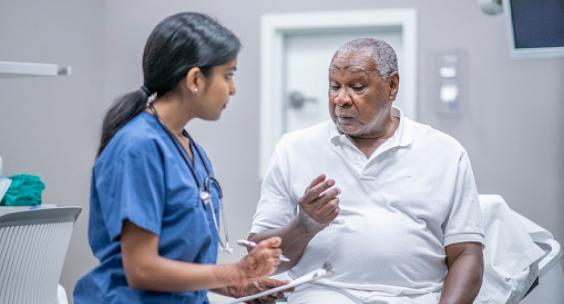With a colonoscopy, your doctor is able to detect early problems that could lead to colon cancer. During this simple and safe procedure, your doctor will use a camera called a colonoscope to examine your colon and rectum, looking for abnormalities, like polyps and lesions.
What is a Colonoscopy?
A colonoscopy is able to detect early problems that could lead to colon cancer. Colonoscopy is the preferred test to detect and treat colon cancer, while other screening tests can detect colon cancer with further follow up treatment required.
This procedure is nothing to feel embarrassed about. Before the procedure, your physician may give you a mild sedative to keep you comfortable. In some cases, a stronger sedative may be used so that you can be asleep during the procedure. Complications are rare with colonoscopy procedures. However, as with any medical procedure, it is important to be aware of potential complications no matter how small the risk. You should call your doctor immediately if you experience severe abdominal pain, a firm, bloated abdomen, vomiting, fever, or bleeding following a colonoscopy.
It is normal to be concerned about what will happen as you prepare for a colonoscopy.
Knowing what to expect beforehand can help you to adequately prepare for a colonoscopy. Proper preparation is important to help ensure that your doctor is able to view all areas of the colon to detect any abnormalities. Talk to your doctor before the test to learn more about how your procedure will be performed.
Colonoscopy FAQs
When should I have a colonoscopy or other colon cancer screening method?
Everyone over the age of 45 should undergo recommended colorectal cancer screening until the age of 75. However, your doctor may recommend screening before the age of 45 if you:
- Have had colorectal polyps or colorectal cancer in the past.
- Have close family members with a history of colorectal polyps or colorectal cancer.
- Have inflammatory bowel disease, Crohn’s disease, or ulcerative colitis.
- Have a genetic condition that increases your chance of colon cancer, such as familial adenomatous polyposis and hereditary nonpolyposis colorectal cancer (Lynch syndrome).
How often should I get a colonoscopy?
Colonoscopies are recommended every 10 years from the age of 45. However, your physician will provide information on follow-up procedures based on your needs.
Are colonoscopies safe?
Complications are rare with colonoscopies, but as with any medical procedure, there are some risks. Although every possible precaution is taken to keep the patient safe during a colonoscopy, there is a small risk of bleeding, bowel tears, and infection.
What might a colonoscopy detect?
Colonoscopy can detect abnormalities in the colon and rectum, such as polyps, that may lead to colorectal cancer. Early detection and removal of polyps reduce your chances of developing colorectal cancer.
Before the Procedure
Prior to preparation, tell your doctor about any medications you are currently taking as your doctor may advise on any adjustments.
To prepare for a colonoscopy, your colon must be completely cleaned out to allow for the greatest visibility of the inside of the colon. Your doctor will give you detailed preparation instructions prior to your colonoscopy. It is important to follow these instructions completely to ensure that the procedure goes as smoothly as possible.
Preparing for a Colonoscopy
Many people find drinking the laxative solution to be the most unpleasant part of a colonoscopy, rather than the procedure itself. To make the solution easier to drink, you can:
- Refrigerate the solution, but do not add ice.
- Drink it through a straw.
- Add powdered sugar-free drink flavoring packets.
Before leaving for your colonoscopy, you may be asked to arrange for someone to help you home once the procedure is complete. Even though you will be awake when you leave, the medications administered during the procedure produce effects similar to alcohol and can cloud your judgement and affect your reflexes.
Preparation for a colonoscopy may include the following instructions from your physician:
- Avoid solid food for one day prior to the test, and drink plenty of clear fluids the day before the test. Clear liquids like water, clear broth, coffee and tea (without milk), ice, or gelatin (except red gelatin) may be consumed up to several hours before the procedure.
- Avoid red and purple liquids, as they can be mistaken for blood in the colon during the procedure.
- You may need to avoid high-fiber foods, including seeds and nuts, for up to a week prior to your colonoscopy.
- You may need to drink a strong laxative solution and empty your bowels to clean your colon sufficiently for the procedure.
Preparation FAQs
Why do I have to avoid certain foods and drinks before my colonoscopy?
Your colon must be completely clear to allow for the greatest possible visibility of your colon during the colonoscopy. Certain food and beverages can also mimic the appearance of blood or abnormalities in the colon, and so should be avoided prior to the procedure. Please follow the specific instructions provided by your physician.
What can I eat the day before a colonoscopy?
While you will need to avoid solid foods the day before your colonoscopy, you may have clear liquids like water, clear broth, coffee and tea (without milk), ice, or gelatin (except red gelatin) up to several hours before the procedure. Please follow the specific instructions provided by your physician.
What should I avoid before a colonoscopy?
You should avoid high-fiber foods up to one week before your colonoscopy, and you should completely avoid solid foods the day before your colonoscopy. Clear liquids are allowed (see above question), but purple and red liquids should be avoided as they can be mistaken for blood in the colon. Please follow the specific instructions provided by your physician.
How can I make colonoscopy prep more pleasant?
There are several ways to make the colonoscopy prep taste more pleasant. You may refrigerate the solution, but do not add ice. You can also mix in powdered sugar-free drink flavoring packets, but avoid anything that produces a red or purple color.
During Your Colonoscopy
Medications may be administered to promote relaxation and keep you comfortable during the procedure.
During the procedure, a flexible tube called a colonoscope is inserted through the rectum into the colon. The tube is about the diameter of an index finger, and is lubricated to allow for easier insertion. Your doctor will then gently pump air or CO2 and sterilized water or saline through the colonoscope to inflate the colon so that the entire lining can be viewed.
If your doctor finds any abnormal areas, he or she may take a biopsy. If there are any polyps present, they may be removed as well. Polyps are tissue growths that are generally benign, but can develop into cancer if they are allowed to grow.
Procedure FAQs
Will I be awake during the colonoscopy procedure?
A colonoscopy can be performed while you are awake, but you may also be put to sleep during the procedure. Even if you are awake, you may be given sedation to help you relax.
How long does a colonoscopy take?
Colonoscopy is typically a short procedure, generally lasting 20 minutes to an hour. However, procedure times can vary from patient to patient.
What happens if my doctor finds polyps during a colonoscopy?
If your doctor finds polyps or abnormalities during the colonoscopy, he or she may take a biopsy or remove the polyp during the procedure.
Will my colonoscopy be painful?
You will be given medications to keep you comfortable, so you should not feel pain during your colonoscopy. If you do feel pain, you should tell your doctor.
After Your Colonoscopy
Following your colonoscopy, you will be moved to a recovery area until the effects of the medication have worn off. You may continue to feel bloated and have gas cramps. It is completely normal to pass gas both during and after the procedure–it is actually encouraged that you pass gas, as it will relieve the bloating and cramps.
Medications may make you groggy or limit your activities; follow your doctor’s advice. If you had to stop taking any medications prior to the test, your doctor will advise you on when you should resume those medications. If your doctor took any biopsies or removed any polyps, your doctor’s office will contact you when results are available.
With any medical procedure there is a risk of complications. With colonoscopy, complications are rare, but you should call your doctor immediately if you experience severe abdominal pain, a firm, bloated abdomen, vomiting, fever, or rectal bleeding.
Post-op FAQs
What do I do if my colonoscopy results are normal?
Even if your doctor does not detect any polyps or abnormalities, you should continue to receive regular colonoscopies every 10 years. To increase your chances of normal results for subsequent colonoscopies, try these tips to help you avoid colorectal cancer.
What can I expect after a colonoscopy?
It is normal to experience bloating and gas cramps after your colonoscopy. You may also be groggy from sedation, so you should arrange to have someone drive you home. If your doctor took a biopsy or removed polyps, you should receive your results within 2 weeks.
How long does abdominal discomfort last after a colonoscopy?
In most cases, abdominal discomfort is caused by gas. This is common in the hours following the exam. Walking typically helps to relieve this discomfort. If abdominal discomfort persists, is severe, or is accompanied by fever, contact your doctor immediately.




